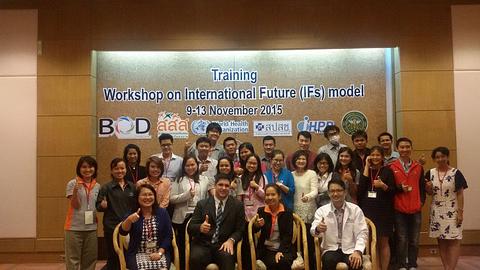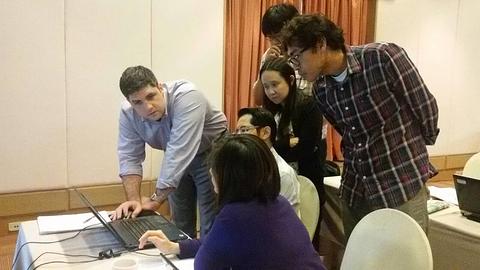Training workshop on International Future (IFs) model
5 days training workshop

1st day (November 9, 2015)
Morning Session
Mr. John McPhee, the instructor of the workshop, introduced the basic information of the IFs model, how the model works, the major themes of the model, how it was used in the past 40 years and provided an example of their clients. Then, the participants introduced themselves and also what they expected from the workshop.
Afternoon Session
The instructor emphasized the point that the IFs model is a multidimensional model. There are several factors that affect the variables of interest. Examples of the elements of the model were shown, what variables were incorporated into the model to forecast the interested variables, and discussed how the IFs model can represent the data in different aspects. The overview of the basic commands, what are they, and what will be displayed from the commands were discussed.
2nd day (November 10, 2015)
Morning Session
John reviewed the important concepts from the yesterday workshop to make sure that all participants are on the same page. Health module was introduced, which started with the indicators used internationally to determine health status. The distal and proximal drivers of health were discussed. Examples of risk factors, forward and backward linkages, how that affects health, and health scenarios were exemplified.
Afternoon Session
In this session, we discussed about health model more in depth, and the equations of how the outcomes derived from. The outcomes of the health module were explained and how to interpret the major outcomes that we got from the health module. The participants tried to create scenarios as we wanted and see what happened to the variables of interested.
3rd day (November 11, 2015)
Morning Session
In this morning, the more complex health module was discussed with more proximal and distal drivers were incorporated into the created-scenarios. Then the discussion was shifted to the economic module, one of the factors that have a large impact on other outcomes. The elements of the economic module and how that affects other variables were explained.
Afternoon Session
The participants were asked to build their own scenarios using 3 parameters from different categories. This helped the participants getting used to the program and had hand on experiences with the program.
4th day (November 12, 2015)
Morning and Afternoon Session
More scenarios of interest were built during this session. Before we ran the results, the expected outcomes were discussed. The forecasts that we’ve got from the IFs were compared to what the participants thought the outcomes should be. The possible rationales behind the changes of the outcomes were discussed.
5th day (November 13, 2015)
Morning Session
We have a guest speaker, Professor Randall Kuhn, in this morning session. The applications of the IFs health submodule were discussed. He walked us through the process of how the real scenario was built, what factors were considered, and why they were incorporated into the model using his cookstove research as an example. PAF calculation was instructed.
Afternoon Session
Both speakers help building scenarios using the participants’ drivers of interested. The outcomes were discussed on why the outcomes changed and what are other factors that were not incorporated into the models could impact the outcomes.
ความเห็น (0)
ไม่มีความเห็น
